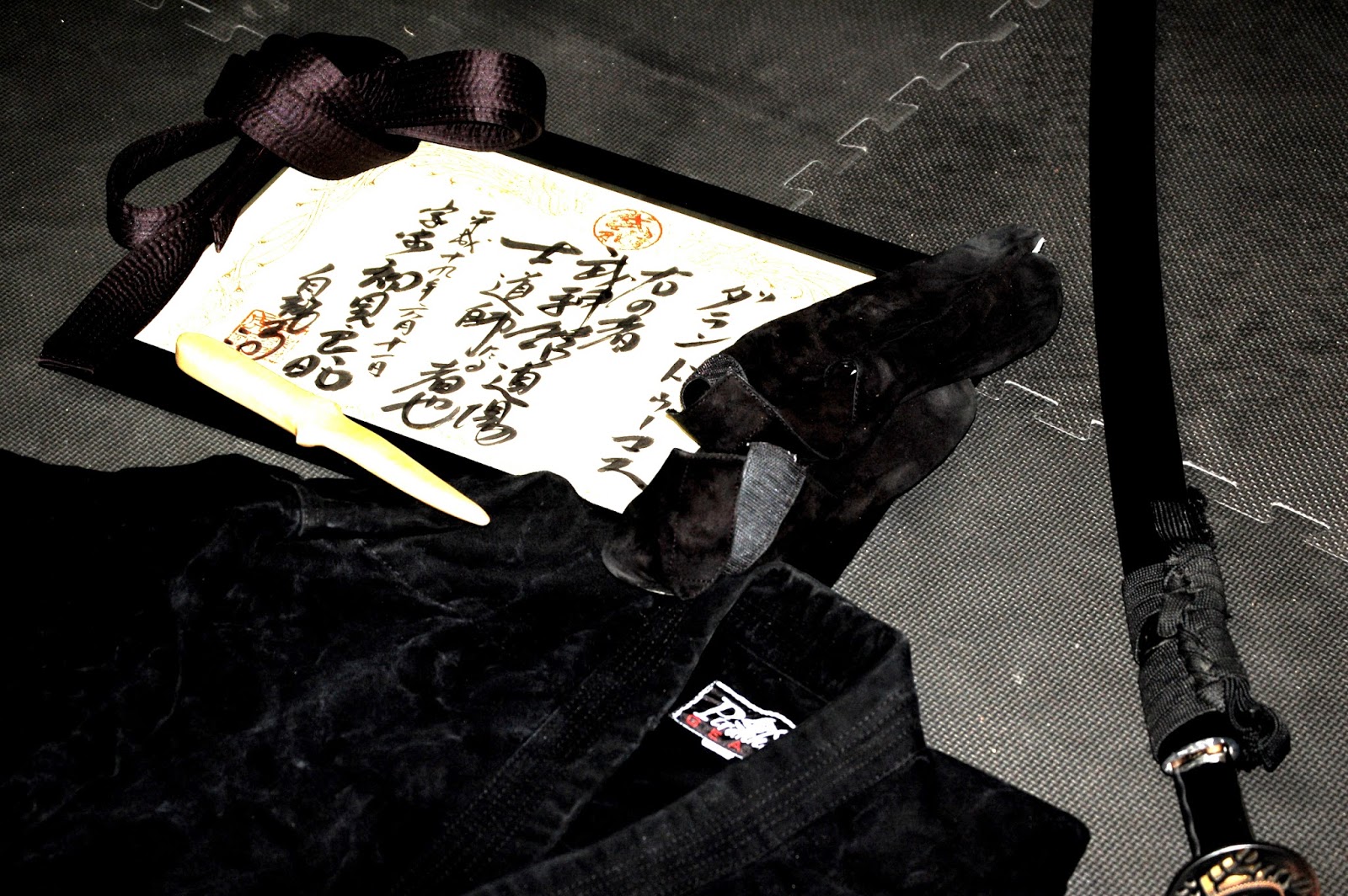So you want
to be a black belt?
There are
many things about martial arts which are silly, confusing and even misleading. We may think we know what we’re talking
about, but to a layman it must sound like gibberish. However, if we really stop to listen to
ourselves, to really think about what’s commonly said or written, we may find
that we really don’t understand. Our
Soke is a master at this, where we read or hear something and think we
understand – only to gain a totally different interpretation and understanding
later on.
One big
stigma that falls into this is the subject of belt ranks. It seems that, particularly in the Bujinkan
organization I belong to, there are so many mixed messages regarding the
importance of rank. You’ll hear people
say rank doesn’t matter. You’ll hear
people say rank is a personal thing between teacher and student. You’ll also hear people talk about the
yearning to be a black belt. That latter
part is what I want to write about here.
What does it
mean when someone says they want to BE a black belt, anyway? Are they really saying they want to be a
strip of black cloth that’s tied around the waist of someone? I doubt it, although nothing surprises me.
I believe
most people have some sense of what kind of person is a black belt wearer. For a new person, that usually means some
kind of measurable skill level beyond just a basic grasp of techniques. Some may even think it denotes a kind of
mastership. But, if we consider this
from different perspectives, we begin to see that a black belt really isn’t a
very concrete thing.
In a
curriculum based school, a black belt is an achievement based upon learning and
adequately performing the material required for the black belt. It’s a narrowly defined purpose and
result. Other schools may be more
holistic, focusing on gaining some level of understanding of principles, demonstrated
in a broader range of physical expressions.
Some may go so far as to not have any requirements, basing ranking
purely on the subject opinion of the teacher or recommendations from a
panel. In our Bujinkan organization, we
have all the above, making the image of a Bujinkan black belt something that
isn’t so clearly defined.
When a new
student expresses a desire to “be a black belt”, I feel some questions need to
be asked. What do they think being a
black belt means? Why is that so
important to them?
If one
wanted to EARN a black belt, then they are saying a very specific thing. But, to BE a black belt is relating more to
an ambiguous quality they wish to embody in themselves, an archetype of what
they believe a black belt student should be, which could encapsulate a wide
variety of images. To BE a black belt is
to conform themselves to their own fantasy image or expectation. To EARN a black belt means they conform to
what the school or teacher demands in order to receive a black belt. Although a student may often pursue both
aspects while achieving the goal of obtaining a black belt, the difference is
important.
In my
opinion, a student receiving a black belt needs to be satisfied with both BEING
and EARNING the belt. Anybody can put on
a black belt, but in so doing fraudulently, they are not BEING a black belt and
they certainly haven’t EARNED it. But,
one can earn a black belt and fail at being one. Many work hard to earn their black belt, but
because they have made the mistake of placing too much importance on receiving
the belt and not being the kind of person who has one, they end up stopping
there and never progressing. Some even
experience depression and frustration, due in large part to the black belt not
meeting their self-created expectations of what it is.
What, then,
does it really mean to BE a black belt?
That means not only earning it, but maintaining the same passion, drive,
focus and hard work it took to get there.
This is what takes you into the various grades of black belt. It takes being a diligent student in order to
EARN a black belt, but it also takes being a diligent student to BE a black
belt.
So, contrary
to the current popular opinions, rank does matter. But, it’s HOW it matters that the importance
is placed. Rank should be something
earned, but not as a one-time trophy or status or some kind of possession. It should be a measurement of your knowledge,
skill and experience. At the same time,
it should be something that fits what a person of that rank should be. Who sets that expectation? It is a combination of what you place on
yourself and the expectations of your teacher.
Earning
ranking isn’t something you do every few months or whenever testing is conducted,
like passing an exam for a class. You
are tested on it every day, every time you step onto the mat. You are challenged not only with learning the
skills it takes to reach that belt rank, but also in maintaining those
skills. From there, you have a platform
to build upon, to grow into the next higher rank. But, if you sit back on your ranking, putting
in just enough to maintain without continuing to refine, stop learning new
things and not growing in knowledge, skill and experience, you have failed at
being a student.
And being a
student is at the core of being a black belt.
Being a student is to have passion for learning, the commitment to train
honestly and with determination, and having the patience to keep going without
settling or letting the rank become a resting point.
The process
from white belt to black belt is deeply personal and contains many
challenges. It is the fire of challenge
and trials that creates growth. When a
new student begins, they will have an understanding of what earning and being a
black belt means. However, as they
progress, their own image of what it means to be a black belt will change. This is important, as it should serve to
guide them, like a beacon on a hill or an example to model themselves after. At the same time, they learn new skills and
build confidence when they see themselves executing them with greater
efficiency and ability. But, as they
progress, they discover there are always levels beyond what they thought they
knew and, in that, they begin to see that there is a balance between quantity
and quality. That hunger to evolve the
techniques they know, to reach those deeper levels, becomes weighted against
learning more and more techniques.
In those
pursuits, the meaning of ranking may change and carry less importance. For some, they are still clinging to ranking
over the substance of their training, showing it’s more important for them to
receive ranking than to grow as a student.
Instead of looking to sempai (seniors) and sensei (teachers) as examples
to try and emulate, they look to curriculum and textbooks for technical data in
order to do just what they need to earn the next ranking.
They are
chasing the belt instead of the art.
They may earn their black belts, but they will likely fall short of being
black belts.
So, you want
to be a black belt? Start by being a student
and never stop being that student. Understand
what it takes to earn a black belt from the teacher you choose to learn
from. Then, train as hard as you can and
let it come to you through your actions.
The day they put a black belt around your waist and give you your Shodan
menkyo (certificate), you’ll experience a new struggle. Everybody goes through it, some more than
others. You will have three things going
on at the same time, some stronger than others:
- You’ll wear your black belt as a symbol of your status, with an expectation that you are now proficient and an example for others. Instead of looking ahead to what’s next, you’ll want to show off what you have now.
- You’ll feel like you haven’t truly earned what you believe a black belt to represent. You’ll even feel somewhat embarrassed or ashamed to wear that black belt for the first time in class or have others refer to you as a black belt. You’ll train hard, trying to embody what you think you should be like in order to feel good about wearing that belt.
- You’ll just put it on and keep going, giving it little thought. You just see it as recognition from your teacher, nothing more, and you just keep showing up and training hard like you have all along.
The problem
with the first two is that they both place the belt rank in too high of
importance. Whereas, the first attitude
will eventually cause a student to fade away from training, the second could
lead to quitting out of frustration. It
could also lead to a serious lack of confidence, real confidence that one needs
to have to be a strong budoka. Humility
isn’t the opposite of confidence, so don’t confuse the two. The third one is the rarest, but likely more indicative
of what a successful, lifelong student embodies. However, few, if not most, never can really
have that as their main perspective.
We
all have a mix of the three. I can
attest to times when the first two were dominant. For me, often the higher rankings I’ve
received have left me feeling inadequate.
I felt I hadn’t quite earned it yet, so I would keep training. That’s a good outlook, but if I never felt
adequate for my rank, then I risk feeling like I’ve wasted my years of
training. At some point, I need to
accept the recognition from my teacher and keep training.
What I never
want to do is to settle or rest myself on my rank. Of all the three, that one is the most devastating
to a martial artist. Yet, we do have
moments where we enjoy our new rank, where the ego prods us to believe we are
better than a Kohai (junior student). It
happens to everybody, including me, and I have to just get with my Sempai and
Sensei to realize I have so much more to learn and grow that I can’t afford to
sit back and coast. In that regard, rank doesn't really matter, then, does it?
So, I just
accept what I am given and keep going, because I know that regardless how high of ranking I may receive, there will always be an endless path lying before me, drawing me deeper and deeper ahead in pursuit of knowledge, skills and experience. There is no belt, no rank, no certificate, which can replace the fire of that passion and the personal rewards of that endeavor. That's the secret to belt ranks and something that may be intellectually understood, but has to be experienced to be fully embodied in the heart.





